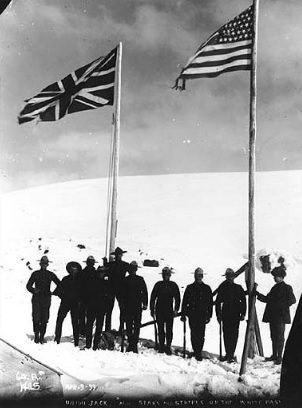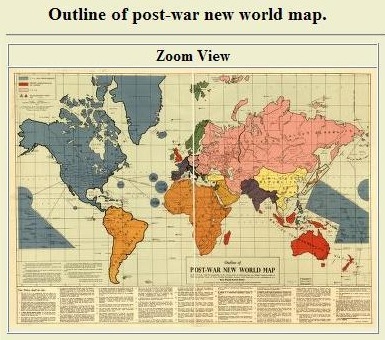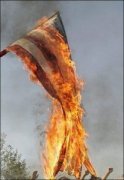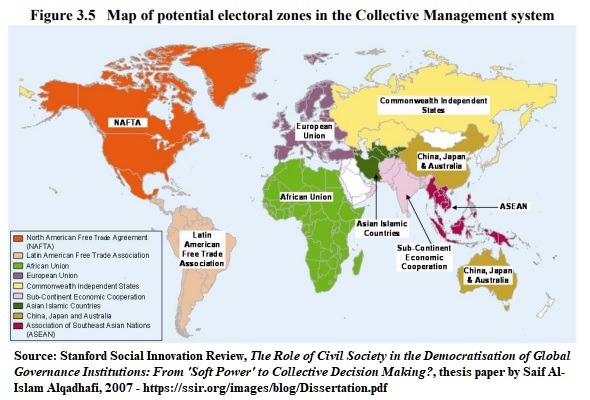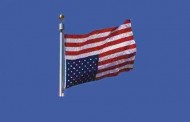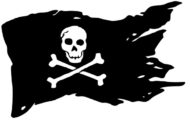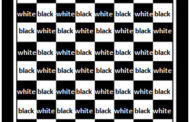The ink was barely dry on the U.S. Senate’s ratification of the United Nations Participation Act of 1945 when the first UN conference on Trade and Development was scheduled.
Background
The negotiations for the UN’s financial system began in the early 1940s at Bretton Woods, CT. Agreements were reached on the International Bank for Reconstruction and Development (World Bank) and the International Monetary Fund (IMF). The third leg of the international system was to be an International Trade Organization (ITO). UN Conferences on international organization of trade were held between 1946 and 1948.
The final agreement to establish the International Trade Organization (ITO) was completed in Havana, Cuba early in 1948. The charter they produced was nicknamed the Havana Charter.
Final Act of the United Nations Conference on Trade and Employment
The Economic and Social Council of the United Nations, by a resolution dated February 18, 1946, resolved to call an International Conference on Trade and Employment for the purpose of promoting the expansion of the production, exchange and consumption of goods.
The Conference, which met at Havana on November 21, 1947, and ended on March 24, 1948, drew up the Havana Charter for an International Trade Organization to be submitted to the Governments represented.
President Harry Truman transmitted the Charter to the U.S. Senate on April 28, 1949 with a Special Message. The U.S. Senate did not ratify the Havana Charter because of concerns for U.S. sovereignty.
Notice on page 7 of the Havana Charter – the name Eric Wyndham White:
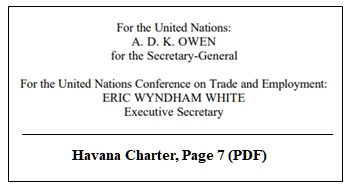
The following is an extract of the biography of Sir Eric Wyndham White’s posted on the Institute for Management Research, Radboud University, Netherlands (which appears to be a great resource).
Emphasis added –
His political leanings seem to have been progressive as he subsequently joined the Reform Club (1940-1980). While a student, he was a member of the British delegation that attended the 1937 congress of the International Chamber of Commerce (ICC), at which business leaders gathered to promote world peace through economic interdependence. In 1937 the ICC met in Berlin, a time when the worst effects of the Great Depression were lifting, but relations amongst states were toxic. Adolf Hitler welcomed the business representatives at the opening meeting and praised their efforts to use trade to bring peace to Europe. Despite such a cynical endorsement, Wyndham White believed that liberal international trade was essential to a prosperous and peaceful world. He attended another meeting of the ICC in Copenhagen in 1939.
. . . At the end of the (Havana) conference, part of the draft charter that dealt with tariff negotiations and some general trade rules were bundled with the results of tariff negotiations and introduced as a temporary agreement. It went by the name General Agreement on Tariffs and Trade and, over the course of the next year, it was taken up by 23 countries.
The almost passing reference to White’s attendance at the conferences of the International Chamber of Commerce (ICC) belies the significance of that connection. The Havana Charter and the path of White’s career in international trade tells the story.
The founding of the ICC was published (1938) in a book titled, Merchants of Peace: Twenty Years of Business Diplomacy through the International Chamber of Commerce (1919-1938), copyright by the Carnegie Endowment for International Peace. Thomas J. Watson, CEO of IBM became President of the ICC in 1937.
The International Chamber of Commerce is a cartel of corporations that serve the interests of the cartel membership. Despite marketing propaganda to the contrary, the interest of the cartel membership is simply money and the power to keep making money.
Havana charter
Article 33
Freedom of Transit
2. There shall be freedom of transit through each Member country, via the routes most convenient for international transit, for traffic in transit to or from other Member countries. No distinction shall be made which is based on the flag of vessels, the place of origin, departure, entry, exit or destination, or on any circumstances relating to the ownership of goods, of vessels or of other means of transport. p.49 (pdf)
1. Members recognize the desirability of increasing freedom of trade by the development, through voluntary agreements, of closer integration between the economies of the countries parties to such agreements. They also recognize that the purpose of a customs union or free-trade area should be to facilitate trade between the parties and not to raise barriers to the trade of other Member countries with such parties.
Article 44
Customs Unions and Free-Trade Areas
3. (b) with respect to a free-trade area, or an interim agreement leading to the formation of a free-trade area, the duties and other regulations of commerce maintained in each of the constituent territories and applicable at the formation of such free-trade area, the duties and other regulations of commerce maintained in each of the constituent territories and applicable at the formation of such free-trade area . . . p.60 (pdf)
British Roots of the Merchants of Peace
Thomas J. Watson, IBM, Merchant of Peace
International Chamber of Commerce (ICC)
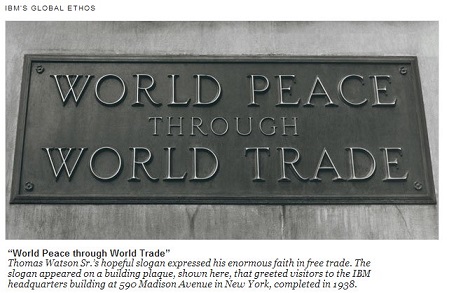
Systemic Corruption
City of London
Associated Power
Lord Lothian
Anarchy Defined as Nation-State Organization
On Sunday November 27,1938 The London Observer covered a speech by Lord Lothian, the wartime British Ambassador to the United States. Lord Lothian is a title. The Lord’s given name is Philip Kerr. The speech was titled “Wings Over History, A New Civilization.” In his speech he stated…. “the anarchy of multitudinous national sovereignties is about to dissolve . . . the world is going to fall into four or five main political and economic groups, each in great measure self-supporting, each under the leadership of a great State equipped with modern military and air power . . .”
A biography of Philip Kerr aka Lord Lothian was found in the Journal of Liberal History. The author wrote:
“He was beginning to move toward world federalism, which might start with the British Empire and the United States: ‘The cure for war is not to weaken the principle of the state, but to carry it to its logical conclusion, by the creation of a world state.”
22 Journal of Liberal History 98 Spring 2018, Page 3, center column
In 1942, Morris Gomberg published a “Moral Map” of the plan for world reconstruction. The map corresponds to Lord Lothian’s description.
Trade Policy to Rob the American People,
Subvert Our Sovereignty
While Building the World State
Organization of the American States
The Organization of American States is obviously one of the “four or five political or economic groups” called for by Lord Lothian designed to eliminate “the anarchy of nation-state organization”.
On January 13, 1949 – Truman sent a Special Message to the Senate concerning ratification of the Charter of the Organization of American States. The text of the original Charter of the Organization of American States was found on the website of the Naval War College.
[June 16, 1951 President Truman’s statement upon Senate ratification of the Charter of the OAS]
“IT HAS BEEN very gratifying to me to sign the instrument of ratification of the Charter of the Organization of American States. This charter, drawn up and signed for the 21 American Republics by their representatives at the Bogota Conference in 1948, provides the constitutional basis for Western Hemisphere unity, through consultation and joint action, within the framework of the United Nations.”
January 17, 1949 – Reorganization of the Administrative government
Point Four – State Department’s
Plan for Coup d’etat
On June 24, 1949, Truman sent another special message to Congress. This message recommended the Point Four legislation that called for programs to begin building the world economy beginning with assistance to undeveloped countries (International Technical Cooperation).
Report to Congress: Point Four giving background and program “prepared for the use of the Committee on Foreign Affairs of the House of Representatives by the Legislative Reference Service, Library of Congress, largely from materials supplied by the Department of State” July 1949:
“An increase in their productivity should enlarge the share of the underdeveloped areas in international trade, helping thereby to provide both greater balance and heightened activity in the world economy.” P.7
Geographic Scope – P.8
Secretary of State in charge, P.18
In plain language, the State Department was writing their own legislation – passing it through an internal committee operating between Congress and the State Department. Where is the provision in the Constitution for this?
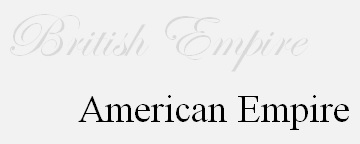
NOTE: The Charter of the Organization of American States was favorably considered by the Senate on August 28, 1950, and was signed by the President on June 15, 1951. It entered into force on December 13, 1951, and was proclaimed by the President on December 27, 1951.
World Bank Timeline – the site communicates the story of how the World Bank’s mission evolved from a facilitator of post-war reconstruction and development to its present-day mandate of worldwide poverty alleviation and the promotion of shared prosperity.
Gray Committee Report to Truman, 1950
Report to Truman, Partners in Progress, proposes an International Development Authority, 1951
Using Trade Policy to Build Empire for Big Business
Prior research –
Operation Pan America – The Alliance for Progress
Kennedy: Regionalizing Latin America
International-to-National Policy Boomerang, 1961
1964 – Trade and Development, Policy Statements: Proceedings of the United Nations Conference on Trade and Development, Geneva, 23 March–16 June 1964 (See Fifth Committee) E/CONF.46/141, Vol. II
Towards a New Trade Policy for Development, Raul Prebisch, Secretary-General of the UN Conference on Trade and Development, E/CONF.46/3, 1964 Regional Commissions
Resolution 1995 (XIX) Establishment of the United Nations Conference on Trade and Development as an organ of the General Assembly. 30 December 1964
The Grand Design – 1967 congressional hearings on U.S. trade policy. Notice the references to Eric Wyndham White.
1968, World Bank President Robert McNamara asks Lester B. Pearson to lead a new World Bank Commission, Commission on International Development. The Pearson Commission produced the Partners in Development report. (Note McNamara connection to Ford Motor Co. and the Ford Foundation.)
Subversion of America for World Communism – See Trade Act of 1974
The Grand Design
1967 Congressional Hearings on Foreign Trade
New International Economic Order
World Economic Forum
International Chamber of Commerce and the World Economic Forum
Notice on the right hand panel under the heading of ‘Partners’, the Center for International Enterprise (CIPE). CIPE is one of the four foundations established under Ronald Reagan’s National Endowment for Democracy in 1982.
National Endowment for Democracy
The Alliance is led by the World Economic Forum, the Centre for International Private Enterprise and the International Chamber of Commerce in cooperation with the German development agency, Gesellschaft für Internationale Zusammenarbeit. It is funded by the governments of the United States, Canada and Germany.
— — Paul Fekete, Trade Team Leader, USAID Center for Economics and Market Development
The biggest joke of all on the American people is that our tax dollars were used to build this cartel of businesses that exported our economy to build the economies of other countries, while our young people are being destroyed by a dearth of good jobs, open borders and the importation of drugs; foreign corporations are buying our critical infrastructure and our resources, our young people can’t afford to buy homes and the government is funding the ‘community marxists’ who are social engineering our communities – destroying our culture and our lives.
How are we doing you dumb sons of bitches?
Related Articles
The History of GATT and the Current Crises in the Global Order
Senate consideration of H.R.4426, July 13, 1994, Foreign Operations, Export Financing, and Related Agencies, Appropriations Act of 1995. Debate begins page 16 (pdf). Floor Speech by Patrick Moynihan page 33 – reference to Eric Wyndham White, page 34. Page 35, (business) Alliance for GATT. Page 38, State Attorney’s General request state-federal summit on potential impact of new global trade rules.
Feature image source: Wikipedia, British Empire Flags
Proceedings – propose transit for landlocked countries, 1964 Fifth Committee
UN Treaties, published 1967, freedom of transit Resolution begins on pg 23
Resolution 8641 – extracted from UN Treaties
Res 3343, 1974 NIEO
Gardner Report, 1975 (reform for NIEC)
ADDRESS BY AMBASSADOR RICHARD GARDNER: `FRANKLIN ROOSEVELT
AND WORLD ORDER: THE WORLD WE SOUGHT AND THE WORLD WE
HAVE’ (Senate – October 21, 1996) local pdf – Gardner_World_We_Sought 1996 UN_History_Gardner_Speech_1996
Stanford – archive of GATT Documents link on page goes to WTO archive
Trade Conferences
R E P O R T O F T H E S E C O N D S E S S I O N OF THE PREPARATORY COMMITTEE OF THE UNITED NATIONS CONFERENCE ON TRADE AND EMPLOYMENT, Geneva, August 1947
Link: https://thetechnocratictyranny.com/PDFS/UNCTAD_2nd_Mtg_E_PC_T_186-EN.pdf
Towards a New Trade Policy for Development, Raul Prebisch, Secretary-General of the UN Conference on Trade and Development, E/CONF.46/3, 1964 Regional Commissions Page 5
1964 – Trade and Development, Policy Statements: Proceedings of the United Nations Conference on Trade and Development, Geneva, 23 March–16 June 1964 (See Fifth Committee) E/CONF.46/141, Vol. II, page 100 – transit, 267; Fifth Committee responsible for transit- landlocked
WTO Debate – Trade History
Moynihan, WTO debate (H.R.5110)
The PRESIDENT pro tempore. Mr. Moynihan, the Senator from New York, is recognized.
Mr. MOYNIHAN. Mr. President, I yield myself such time as may be required to make an opening statement on, as Reverend Halverson said, this last day of the 103d Congress and the momentous–as I see it and many do–decision we will make at the end of this day and at the end of this Congress, which is the decision to ratify or not the legislation that will put into effect the Uruguay round of the General Agreement on Tariffs and Trade culminating 60 years of American trade policy that began with Cordell Hull in 1934.
The Washington Post has an editorial this morning which, in the view of this Senator, sums up the case with great clarity and force. I would take the liberty, sir, of reading it to the Senate.

